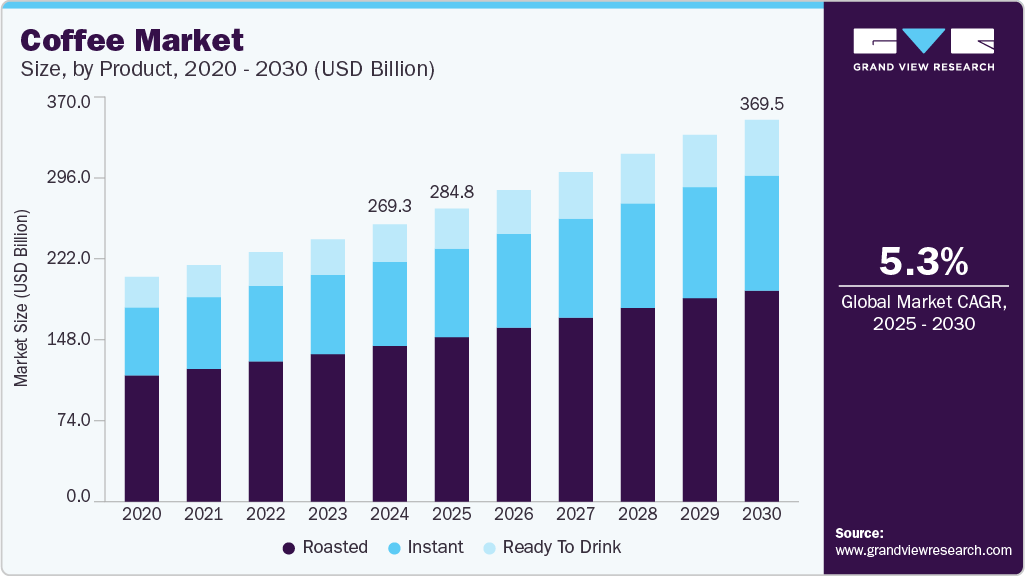The global coffee market was valued at USD 269.27 billion in 2024 and is projected to reach USD 369.46 billion by 2030, growing at a CAGR of 5.3% from 2025 to 2030. The market's expansion is primarily fueled by strong and growing demand for coffee worldwide.
Coffee remains one of the most widely consumed beverages globally, with increasing popularity in emerging markets such as the Asia Pacific region. Rising disposable incomes, evolving lifestyles, and the growing influence of coffee culture are significantly contributing to market growth. According to a 2024 report by the National Coffee Association (NCA), coffee ranks as the most consumed beverage in the U.S. after water, with 67% of adults reporting daily consumption—a 49% increase since 2004. These figures underscore how steady consumer demand and changing preferences are propelling market expansion.

The market is further shaped by growing interest in specialty and gourmet coffee, as well as increasing preference for organic, sustainable, and single-origin options. These varieties are perceived to offer superior quality and distinct flavor profiles, encouraging consumers to spend more on premium products. As a result, producers, roasters, and retailers benefit from enhanced profitability and revenue. Moreover, the proliferation of convenient coffee formats, including pods and capsules, has revolutionized consumption habits, driving further growth.
Key Market Insights:
- Europe led the global coffee market with a 34.1% revenue share in 2024, primarily due to the rising popularity of specialty coffee shops in Western Europe, which focus on high-quality brews.
- By product type, roasted coffee held the largest share of 56.1% in global revenue in 2024, driven by the global expansion of major chains like Starbucks and the widespread adoption of coffeehouse culture.
- By distribution channel, B2C sales dominated with a 62.4% revenue share in 2024, reflecting consumers' growing interest in premium, specialty coffee beans and a more personalized coffee-drinking experience.
Order a free sample PDF of the Coffee Market Intelligence Study, published by Grand View Research.
Market Size & Forecast
- 2024 Revenue: USD 269.27 Billion
- 2030 Projected Market Size: USD 369.46 Billion
- CAGR (2025-2030): 5.3%
- Europe: Largest market in 2024
- Asia-Pacific: Fastest growing region
Key Companies & Market Share Insights
The coffee market is highly competitive, marked by the presence of numerous international brands alongside a vibrant network of local players. Leading companies are focusing on product innovation, offering premium and specialty coffees, embracing sustainable sourcing, and expanding into ready-to-drink formats to differentiate themselves. Simultaneously, local cafés and restaurants are enhancing the customer experience by offering diverse flavor profiles, often featuring exotic and organic beans along with unique ingredients.
Nestlé, a global food and beverage giant, maintains a strong foothold in the coffee market by leveraging its extensive brand portfolio and global distribution network. Its flagship coffee brands, Nescafé and Nespresso, enable it to effectively cater to a wide spectrum of consumers—from instant coffee users to high-end capsule coffee enthusiasts.
Starbucks Coffee Company is widely recognized for its premium coffee offerings and distinctive café experience. Its expansive product lineup includes coffee beverages, teas, pastries, and branded merchandise, designed to appeal to a broad and diverse customer base. Starbucks operates through a combination of company-owned stores and licensed outlets, ensuring both global reach and localized presence.
Key Players
- Nestlé
- Starbucks Coffee Company
- JDE Peet’s
- Tchibo GmbH
- LUIGI LAVAZZA SPA
- Strauss Coffee BV
- The J.M. Smucker Company
- Melitta Group
- UCC UESHIMA COFFEE CO., LTD.
- Massimo Zanetti Beverage Group
Explore Horizon Databook – The world's most expansive market intelligence platform developed by Grand View Research.
Conclusion
The global coffee market is experiencing significant growth, driven by evolving consumer preferences and innovative product developments. Key trends include a rising demand for specialty, gourmet, and sustainably sourced coffees. Convenient formats, such as coffee pods and ready-to-drink options, are also gaining popularity. Major coffee-producing regions and countries, along with changing demographics, continue to shape market dynamics. The industry is characterized by high levels of innovation and strategic activities as companies expand their offerings and market presence.






